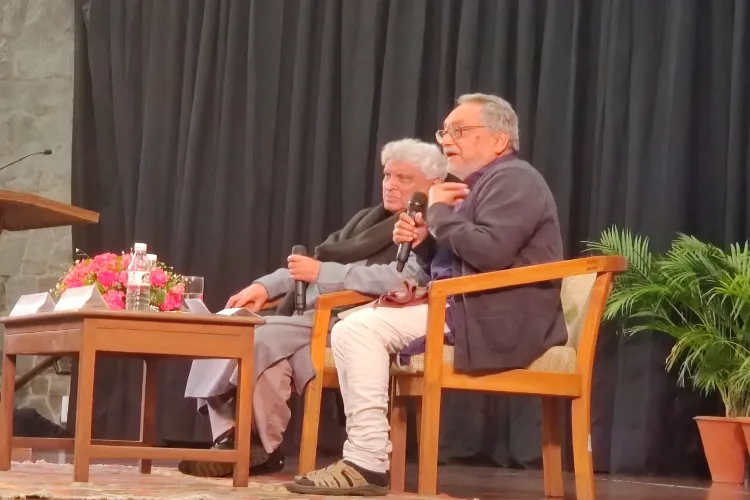
Tripti Nath/ New Delhi
“I write Hindustani because I am writing for Hindustanis. I am neither writing for Urdu nor for Hindi wallahs. The day you start addressing Hindustanis, your language will get corrected on its own,’’ said noted lyricist and poet Javed Akhtar during a discussion on ‘Hindi & Urdu Siamese Twins’ here on Thursday evening.
The auditorium was packed to capacity and the audience happily braved the cold to sit on the floor and even stand for a little over two hours to listen to two literary giants, Javed Akhtar in conversation with Prof. Alok Rai, writer and poet who retired from the Department of English, Delhi University.
While introducing the two literary figures, veteran diplomat and President of the India International Center, Shyam Saran said that while seven generations of Javed Akhtar’s family are linked to writing, Alok Rai is the grandson of the celebrated Hindi writer, Prem Chand.
Proposing a dictionary of Hindustani with words drawn from Hindi and Urdu. Akhtar said that the script of the dictionary could be Roman or Devanagari. “Both Hindi and Urdu have so much in common. Why not bring together scholars and writers compile a dictionary and also put together the best writing in Hindi and Urdu? Let me tell you that Prem Chand was writing in Urdu for years before he began writing in Hindi and should be called an Urdu-Hindi writer. Why don’t we compile poetry in Urdu and Hindi? Urdu poetry has a rare flow and melting quality of words. People are sensitive about the script. I suggest Devanagari because there is no scope for wrong pronunciation. You could also have it in Roman as that would save a child the trouble of learning another script.’’
To a question on how Urdu has been neglected over the years and how it is dying at an institutional and State level despite its impressive use in films, Akhtar said, “It is correct that many regimes over some time did not favorably treat Urdu. The number of people reading this script in Hindustan is going down and the number of persons reading Urdu in Devnagri is increasing every day.
“It is not uncommon to find that the Urdu poets whose books are published in Devnagri make it to 24 to 25-volume editions. The popularity of Urdu books in Devanagari is on the rise among the masses but I have no right to ask any Urdu writers to start writing in Devnagri and depart from their script.
“I would like to ask parents why they do not teach their children their mother tongue. Look at the Jews and see how they preserved the Hebrew language for 2000 years because they loved their language if you love Urdu, who is stopping you from giving private tuition in Urdu to your children? Who is stopping you from subscribing to Urdu newspapers and magazines? It is not right to put the entire onus on the government.’’
Rai said, “Along with an official neglect for Urdu, there is also an enormous longing for it. Call it hostility or neglect- there is misunderstanding or worse. Urdu gatherings attract huge crowds. We need to understand this paradox. Urdu has been created using beautiful influences from different corners of the world over thousands of years. In a way, it is a distillation of what is the finest about our civilization. People recognize this quality of Urdu. We long for eloquence. This archive is one place where we find that satisfaction. The hunger for eloquence is intact even though eloquence is decreasing in our public life. The decline of Urdu is always denied and it is projected that it is doing fine.’’
Javed Akhtar explained that tossing out Urdu words from Hindi would damage Hindi. “Borrowing words from other cultures and languages is not a one-way traffic. Languages keep getting enriched by borrowing from other languages. There are so many phrases that have been created by joining words such as Tan (Persian)-Man-dhan (Sanskrit) or Shaadi-Byah. Hindi and Urdu words are used according to the context.’’
Javed Akhtar said that languages such as Maithili, Bhojpuri, and Awadhi have also been neglected despite the extraordinary poetry in these languages.
ALSO READ: In 1857, Ayodhya had emerged as a place of Hindu-Muslim unity against colonial rule
Prominent among those who attended the gathering were former Vice President Hamid Ansari, Congress leader Salman Khurshid, veteran diplomat Surendra Kumar, and noted columnist Poonam Saxena.
